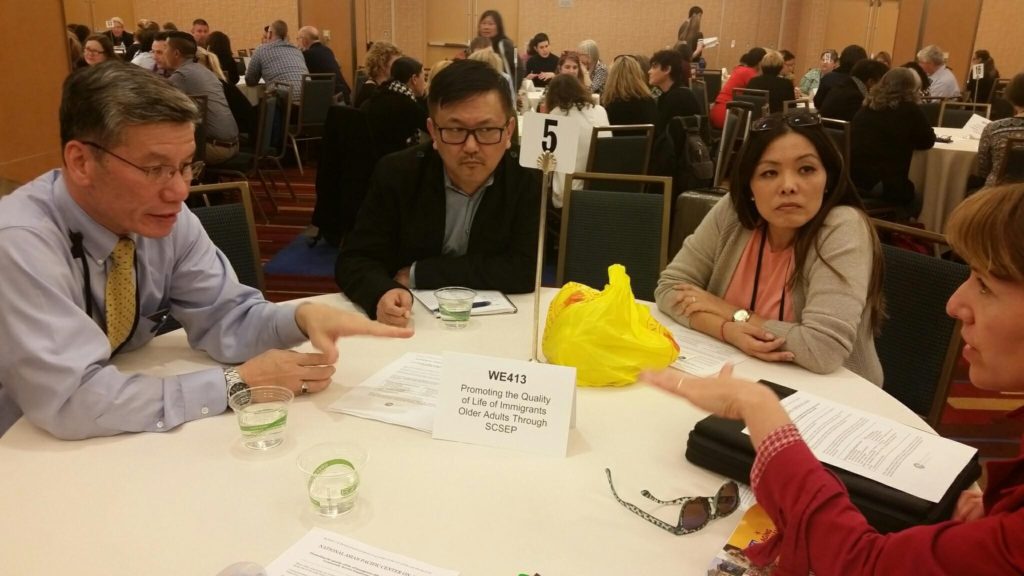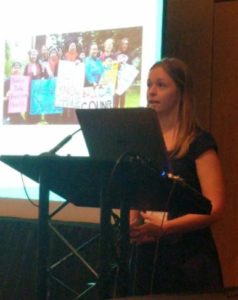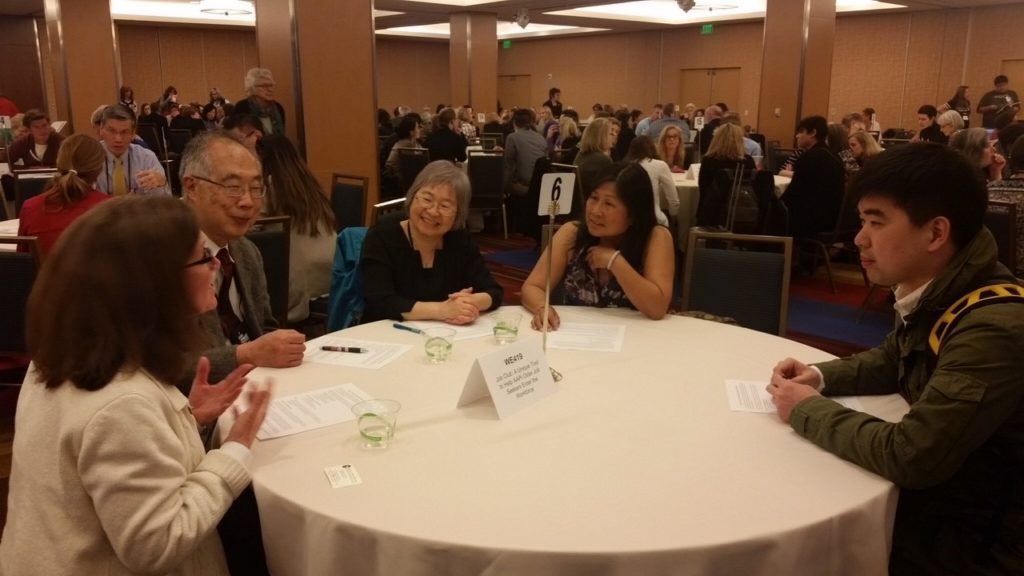Over 3,000 attendees from across the nation and abroad attend the annual American Society on Aging (ASA) Aging in America Conference to learn, network and participate in the largest multidisciplinary conference covering issues of aging and quality of life for older adults.
The National Asian Pacific Center on Aging (NAPCA) has a history of active participation at the Aging in America Conference to discuss and highlight the needs of Asian American and Pacific Islander (AAPI) older adults – this year was no different and we were the recipient of two leadership awards!
This year’s conference (#AiA18) was held in San Francisco, CA from March 26-29. A total of five NAPCA staff and two affiliate staff attended from our project sites in Seattle, WA; Honolulu, HI; New York, NY; Chicago, IL; Boston, MA and Los Angeles and Orange County, CA to present and participate in symposiums, workshops and round table discussions.

Participants at NAPCA’s roundtable discussion about the Senior Community Service Employment Program (SCSEP). (Photo courtesy of NAPCA)
During the Opening General Session, ASA awarded NAPCA the Gloria Cavanaugh Award for Excellence in Training and Education for our National Resource Center on AAPI Aging and the Award for Excellence in Multicultural Aging for our Healthy Eating Healthy Aging program.
“We are grateful to be the recipient of these prestigious awards, and we are humbled and honored to be recognized for our efforts. We are especially thankful for our amazing partners and collaborators, because together, we were able to make a positive impact in the lives of AAPI older adults across the nation,” said Dr. Wes Lum, NAPCA President and CEO.
Find out more about these leadership award and invaluable initiatives at: http://napca.org/napca-recognized-excellence-american-society-aging/

NAPCA Director of Technical Assistance Heather Chun presents on the importance of disaggregated data for AAPI older adults. (Photo by Jenna McDavid)
The following workshop and round table discussion was led by NAPCA staff and our community partners:
- Successful Interventions That Lead to Healthy AAPI Older Adults With Limited English Proficiency: highlighting findings and recommendations from two heart health interventions with limited English proficient AAPI older adults (Healthy Eating Healthy Aging and Check, Change, Control) as well as the design of action briefs for Asian American caregivers to encourage early identification of dementia.
- Job Club: A Unique Tool to Help AAPI Older Job Seekers Enter the Workforce: highlighting AAPI older workers in the U.S., especially those who are facing multiple barriers in entering the workforce. Attendees learned how the Senior Community Service Employment Program has provided a platform for AAPI older job seekers to learn about the working environment and overcome the barriers to be employed through Job Club activities.
- Promoting the Quality of Life of Immigrant Older Adults Through SCSEP: Discussing how the Senior Community Service Employment Program (SCSEP), a federal program targeted to help older workers, helps thousands of low-income seniors to gain valuable job skills while helping out in the community. This workshop showed how SCSEP can improve the quality of life of minority Asian American Pacific Islander seniors.
Together with our community partners, NAPCA participated in the following symposium and workshop:
- Elder Abuse Within Diverse Communities: Prevention, Treatment and Systemic Solutions: A panel discussion within the ASA Network on Multicultural Aging (NOMA) Constituent Group Program, this session focused on elder abuse in culturally diverse communities. Elder abuse is a complex public health issue, with prevalence and incidence rates in diverse communities higher than previously suspected. Despite the accessibility of programs such as Adult Protective Services and the Long-Term Care Ombudsman Program, and policies granting additional protections, diverse older adults often fall through the cracks, with abuse going undetected and untreated. NAPCA and the National Center on Elder Abuse shared recent research and best practices for outreach, education and culturally and linguistically appropriate service provision within AAPI and Latino populations.
- Growing Old in the USA: What Data Tells Us About Diverse Elders: One in five older adults in the United States is a person of color or American Indian/Alaska Native. By 2040, it will be one out of three. Three out of every eight LGBT adults are older adults. In this session, the National Consortium on Aging Resources for Senior’s Equity provided technical assistance on data collection with diverse older adults, including quality data sources for attendees to utilize, their limitations, and best practices for developing data collection methodologies and processes within an organization to support diverse older adults in the community.

Participants in NAPCA’s Job Club roundtable discussion at AiA18. (Photo courtest of NAPCA)
While NAPCA was unable to participate in the following symposium, as a member of the Diverse Elders Coalition (DEC), staff discussed some of the advocacy work we’ve undertaken.
- Fighting for Our Lives: Advocacy and Diverse Elders: In 2017, communities of color, LGBT communities, and American Indian/Alaska Native communities faced several threats to the health and well-being of elders. This session highlighted the ins and outs of engaging in advocacy campaigns at the federal, state and local levels to improve aging in our communities.
While this year’s conference has just concluded, we are already looking forward to attendance and participation at the 2019 Annual Conference in April in New Orleans, LA and continuing to keep the needs of AAPI older adults at the forefront of the national discussion.
To read about our previous ASA involvement, check out the posts below:
2017: https://diverseelders.org/2017/03/16/meeting-the-needs-of-aapi-elders-in-chicago-and-beyond/
2016: https://diverseelders.org/2016/03/29/american-society-on-aging-leadership-institute/
The opinions expressed in this article are those of the author and do not necessarily reflect those of the Diverse Elders Coalition.

